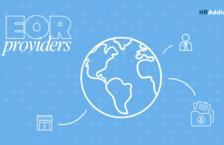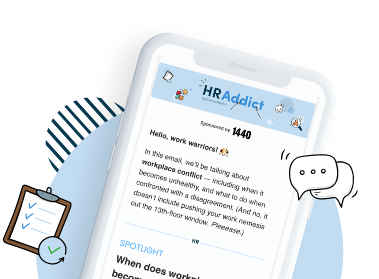Let's talk about something that keeps HR leaders up at night: how do you offer benefits that actually matter to employees scattered across different continents?
Here's the thing—regular paychecks don’t cut it anymore in the global talent market. They're comparing job offers based on who's offering mental health support in Brazil, learning stipends in Poland, or flexible work allowances in Singapore. And if your benefits package looks like it time-traveled from 2015, you're probably losing great people to companies that get it.
The good news? A handful of EOR or Employer of Record providers have figured out that benefits administration doesn't have to feel like untangling Christmas lights. They're using technology, local expertise, and some genuinely creative thinking to make benefits work across borders without giving you a compliance migraine.
We're breaking down seven providers that offer different approaches and innovations in employee benefits. Some are using AI in HR to automate the boring stuff, while others have nailed regional expertise or built platforms that consolidate everything into one intuitive dashboard.
TABLE OF CONTENTS
Borderless AI: AI-powered benefits administration and customization
Here's what makes Borderless AI different: they didn't just bolt AI onto an existing EOR platform as an afterthought. They built the whole program around AI from day one, which means the technology is designed to address real HR problems instead of just sounding impressive in marketing copy.
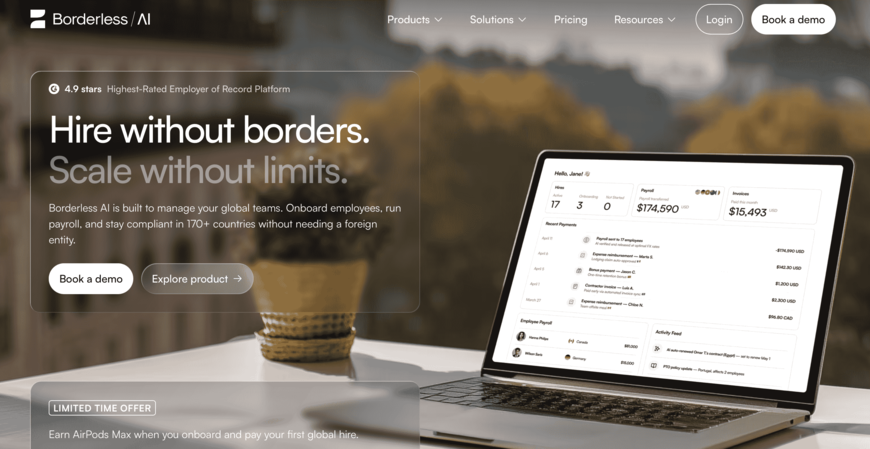
Borderless AI’s innovative administration of benefits
HRGPT is basically just ChatGPT for your HR questions – need to know if a contractor in Portugal should be reclassified as an employee? Ask. Wondering what statutory benefits are required in Colombia? The AI pulls data from their compliance database and can give you an answer in seconds.
It works in 170 languages, so your team in Seoul can ask questions in Korean and get accurate answers about local benefits requirements. This isn't about replacing your HR team—it's about empowering and equipping them better so they're not spending three hours researching tax implications every time someone asks a benefits question.
Automatic benefits enrollment without the usual back-and-forth – new employee in France? The platform knows what's statutorily required (health insurance, pension contributions, meal vouchers if applicable) and which supplementary options make sense. It generates a legally compliant contract, processes enrollment, and gives the employee a clear breakdown of what they're getting. What used to take weeks of coordination can now be accomplished in minutes.
24/7 support based in North America – means you're talking to actual experts, not outsourced tier-one support reading from scripts. When you have a complex benefits question at 9 PM because you're trying to finalize a contract in Germany, you get someone who knows what they're talking about.
The platform integrates with modern HR tech – if you're using BambooHR, Workday, or another HRIS, Borderless AI works without requiring your IT team to build custom integrations. Benefits data flow automatically while time-off balances sync. You don’t have to manually update spreadsheets or juggle multiple platforms.
Covers 170+ countries with localized benefits – so when you're ready to hire in Vietnam or Morocco or Kenya, the infrastructure's all set already. You're not waiting for the provider to "expand into that market" or have to deal with third-party partnerships that create liability gaps. Borderless AI owns the legal entities directly, so there's no vendor daisy chain where no one's quite sure who's responsible for compliance.
Borderless AI Pricing
Pricing is straightforward: flat monthly fee per employee with no surprise deposits or hidden charges. Most EOR providers bury costs in contract terms or require you to prepay salaries. Borderless AI shows you exactly what you'll pay upfront.
For growing companies, no salary deposits or advance funding can mean the ability to distribute funds better for faster business growth. If you're hiring 10 international employees at an average salary of $5,000/month, you're not locking up $50,000. That capital stays in your business.
Lano: Flexible benefits consolidation for multi-country teams
If you're already operating in multiple countries and currently juggling at least three different EOR providers, two local entities, and a spreadsheet that makes you nervous every time payroll runs, Lano built their platform specifically for your dilemma.
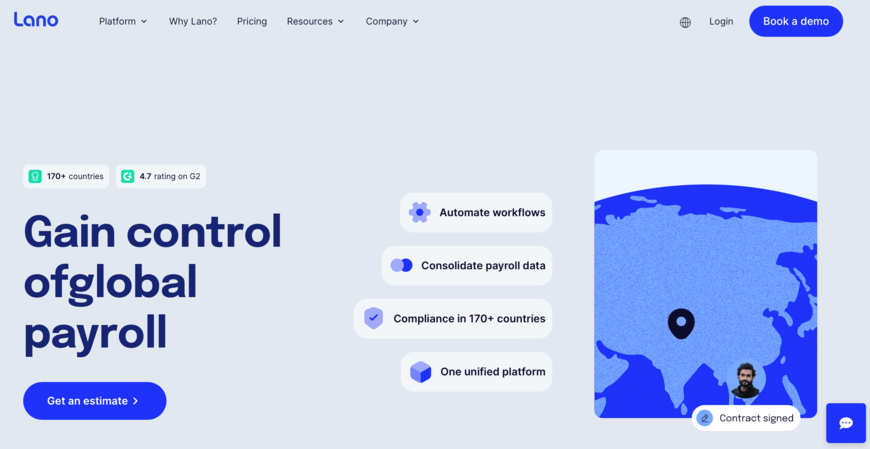
Lano’s innovative administration of benefits
Multi-country benefits consolidation – this is Lano's core strength. Let's say you've been using one EOR provider in Europe, another in Asia, your own entity in the U.S., and maybe a third provider in Latin America. Each one has a different process in benefits administration, reporting formats, and terminology. Lano boasts a feature-rich dashboard where you can see benefits across all countries in one place, compare costs, and spot inconsistencies, so you can better understand what you're spending.
Flexible customization by location – this means you're not locked into cookie-cutter packages. Lano understands that benefits in Stockholm is different from benefits in São Paulo, which isn’t same you'd offer in Singapore. The platform lets you configure supplementary benefits by country or region while processing the statutory requirements automatically. So your engineering team in Poland gets L&D budgets that match local market expectations, while your sales team in Mexico gets benefits that meets their jurisdiction’s standards. You define the strategy; Lano handles the execution.
Integration with existing HRIS and ERP systems – Lano won't force you to rip apart your current tech stack. Working with SAP SuccessFactors? Oracle HCM? Workday? Lano connects to major enterprise systems so benefits data flows bidirectionally. Changes in one system update the other automatically. No more manual data entry or worrying conversations about whether the numbers match.
Lano pricing
Lano's pricing varies based on your specific configuration—the number of countries and employees, and the level of customization you need.
Horizons: Cost-effective benefits for growing teams
Let's be honest about what Horizons is: they're not going to blow your mind with cutting-edge AI or revolutionary benefits customization. But what they can do is provide solid, compliant employment and contractor management in 180+ countries at a price point that won’t make early-stage founders wince. Sometimes that's all you need, especially of your business is just starting out.
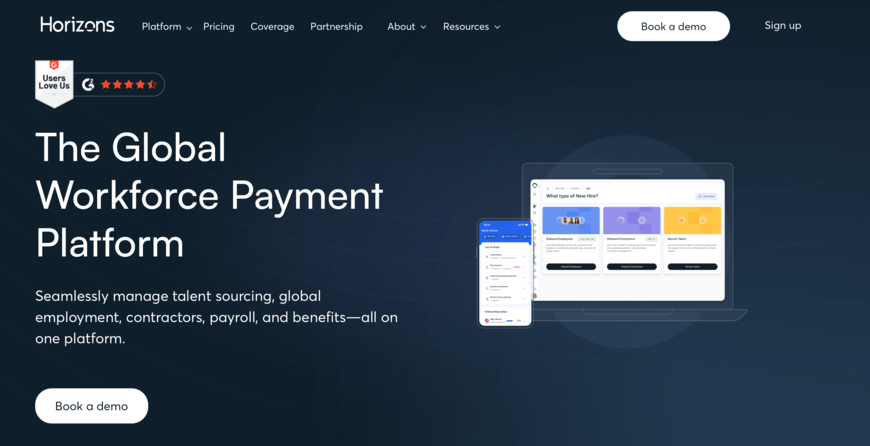
Horizons’ innovative administration of benefits
Competitive pricing that starts at $299/month per employee – this positions Horizons as a budget-conscious option. This is notably lower than many competitors that start closer to $400-600 per month. For companies watching their burn rate carefully or testing international markets before committing significant resources, this pricing creates room for experimentation without massive financial commitment.
180+ countries for contractor management – included alongside EOR services, which means you can start with contractors (lower cost, more flexibility) and convert them to employees when it makes sense. This staged approach helps companies test new markets before fully committing to EOR arrangements. The platform handles classification guidance to help you avoid misclassification risks.
EOR services with expert HR support – provides the compliance foundation and local expertise you need without unnecessary fancy technology layers. Horizons focuses on getting the basics right: compliant contracts, accurate payroll, statutory benefits that meet legal requirements, and responsive support when you have questions. For many companies, especially those new to international hiring, these fundamentals matter more than advanced features they won't use yet.
Horizons pricing
Starts at $299/month per employee for EOR services. Contractor management services are available at different rate structures depending on payment frequency and the countries involved.
Teamed: Specialized benefits for remote-first companies
Teamed built their platform specifically for companies where "remote" isn't a pandemic compromise—it's the entire business model. If your team spans time zones, works asynchronously, and doesn't pretend everyone's coming to an office someday, Teamed's benefits philosophy could perfectly match how you operate.
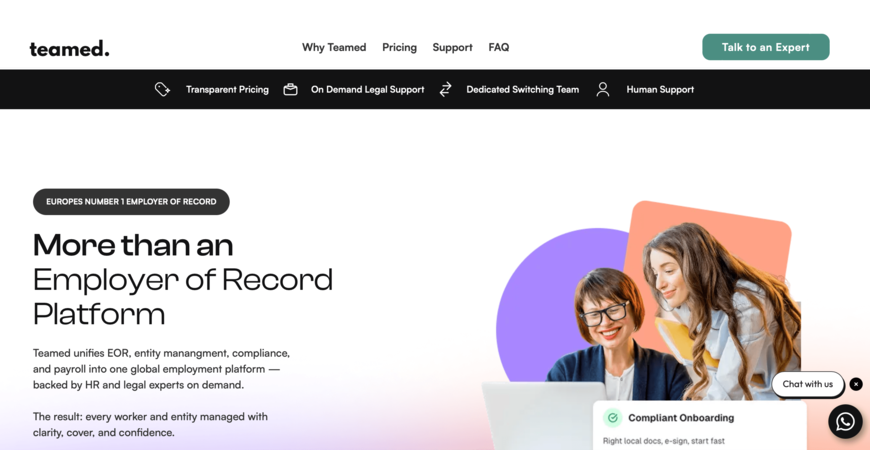
Teamed’s innovative administration of benefits
Remote work-focused benefits packages – Teamed recognizes that distributed employees have different needs than office workers. Home office stipends aren't afterthoughts—they're core offerings. Internet reimbursement makes sense when reliable connectivity is essential for work. Co-working space allowances give people options when working from home isn't ideal. Teamed structures their benefits administration around the reality of remote work instead of adapting office-centric packages with awkward add-ons.
Flexibility in benefits customization – lets you design packages that will reflect your company culture and employee preferences. Maybe your design team values learning stipends for courses and conferences more, while your engineering team might prefer to prioritize health and wellness benefits, and your sales team will require performance bonuses structured differently. Teamed's platform accommodates these variations without forcing everyone into identical packages.
Teamed pricing
Teamed uses custom pricing based on countries, employee count, and benefits configurations.
Asanify: Innovative HRMS integration with EOR benefits
Asanify took a different approach to the EOR market by thinking: What if the entire HR interaction could be done through an interactive chatbot? For companies operating heavily in Asia-Pacific markets and wanting integrated HRMS functionality alongside EOR services, their unique interface creates a surprisingly intuitive experience.
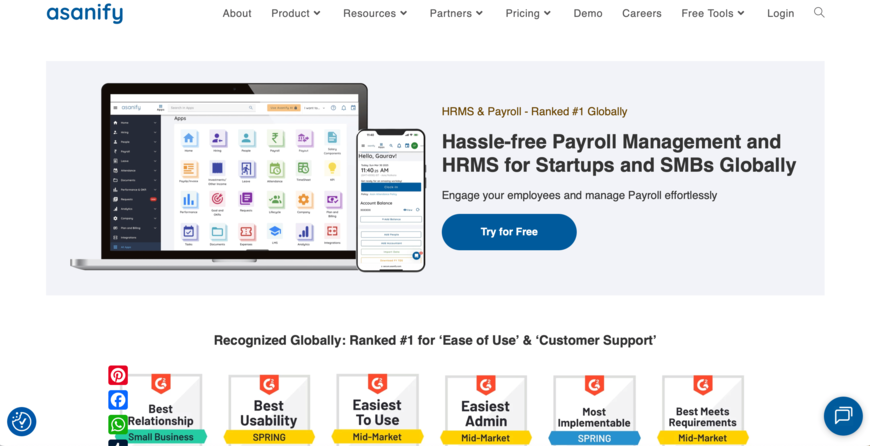
Asanify’s innovative administration of benefits
Chatbot-based Employee Self Service (ESS) - your employees can ask questions and complete tasks just by typing out what they need. "How much vacation do I have left?" "When is my next pay date?" "What health insurance am I enrolled in?" The chatbot understands natural language, pulls data from the system, and responds instantly. This matters significantly in multilingual, multi-country teams where having support available in local languages at any hour becomes challenging. The bot handles routine questions so your HR team can focus on complex issues.
Integrated HRMS, payroll, and EOR platform - combines functions that most providers separate. Benefits administration connects directly to payroll processing, which links to time tracking and leave management. When someone takes parental leave in Singapore, the system automatically adjusts payroll, updates benefits, and ensures statutory payments are processed correctly. You don’t have to reconcile data between separate platforms or worry about whether changes have synced properly. Everything lives in one integrated system.
Asanify pricing
Asanify structures pricing based on configuration—the countries covered, number of employees, and the level of HRMS integration you need. This integrated approach is a better choice than buying separate HRMS and EOR solutions.
Atlas HXM: Enterprise-grade benefits for large organizations
When you're managing hundreds or thousands of international employees, you need infrastructure built for complexity at scale. Atlas HXM is designed specifically for enterprises where "move fast and break things" isn't a worthy compromise and where compliance failures carry significant consequences.
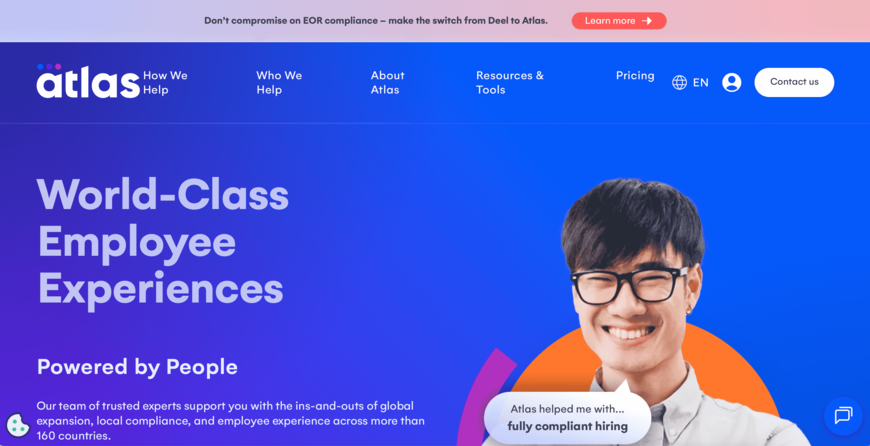
Atlas HXM’s innovative administration of benefits
160+ countries coverage – which includes a deep presence in major markets. Atlas isn't spreading thin trying to claim "we operate everywhere"—they focus on markets where large enterprises actually hire in volume. The coverage includes established markets (UK, Germany, France, etc.) and growth markets (India, Mexico, Brazil, Poland, etc.) where multinationals are building substantial teams.
Comprehensive benefits administration at scale – handles the complexity of offering consistent benefits philosophies across different countries while respecting local requirements and norms. Atlas helps enterprises create benefits frameworks—like the level of healthcare benefits global employees get or specific learning budgets for all technical roles—and then implements these strategies for each country's legal and cultural context. You get consistency in approach without accidentally violating local requirements or offering tone-deaf packages.
Atlas HXM pricing
Atlas uses custom pricing based on employee count, countries, and service level requirements. Enterprise contracts typically come with volume discounts and multi-year terms. You can also negotiate based on your specific needs instead of selecting from pre-set tiers.
Native Teams: Regional benefits expertise with a personal touch
Native Teams takes a different approach in a market increasingly dominated by technology platforms and automation. They understand that for certain companies and certain markets, deep regional expertise and personalized service matter more than platform sophistication or AI automation.
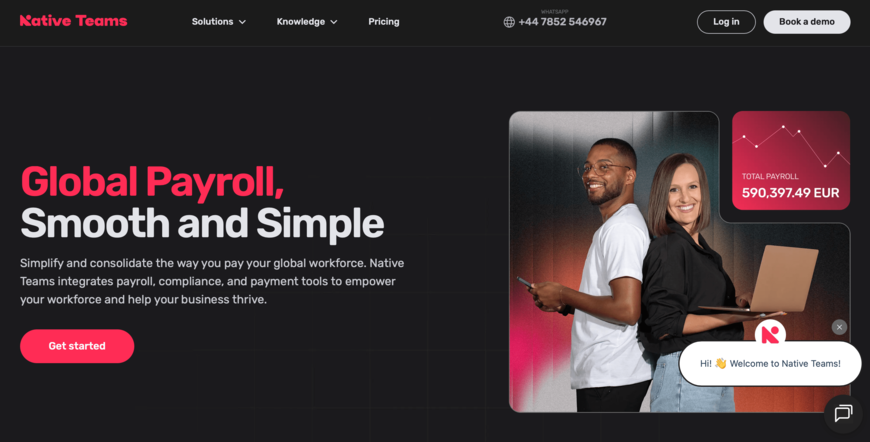
Native Teams’ innovative administration of benefits
Regional benefits specialization – Native Teams focuses on specific geographic areas where they've built exceptional depth. Rather than claiming "we cover everywhere," they concentrate on markets where they can provide reliable expertise. This might be Central and Eastern Europe, specific Latin American countries, or other regions where they've invested in local relationships, market knowledge, and regulatory understanding that goes beyond surface-level coverage.
Personalized customer service approach – they assign dedicated account managers who will learn your business, understand your benefits philosophy, and provide continuity across your employee lifecycle. So, when you call with a complex benefits question about an employee in Poland, you can talk to someone who knows your company's history, understands the specific employee's situation, and can provide contextual advice rather than generic answers. For companies that value relationships over tickets, this service model can feel fundamentally different from platform-first providers.
Native Teams pricing
Native Teams typically uses premium pricing that reflects their personalized service model and depth of regional expertise. You're paying for dedicated attention, deep market knowledge, and service quality instead of going cheap for below-average services.
Understanding EOR benefits compliance across borders
Here's what makes international employee benefits complicated: every country has different rules about what you must provide, how you fund it, who pays for what, and what happens if you mess it up. Getting this right isn't optional—it's how you avoid fines, lawsuits, and very uncomfortable conversations with local labor authorities.
Statutory vs. supplementary benefits – this is the foundational concept. Statutory benefits are legally required—think social security contributions, health insurance mandates, pension requirements, and paid leave minimums. You don't get to decide whether to offer these or not; the law decides for you. Supplementary benefits are everything beyond legal requirements—additional vacation days, mental health support, learning stipends, gym memberships, and other benefits you choose to offer to be competitive.
How requirements vary by country – differences can be dramatic even within regions. Take Europe, for example: France requires 25 days minimum vacation plus public holidays, extensive health coverage, meal vouchers, and works council participation above certain company sizes. Meanwhile, UK requirements are 28 days of vacation (including public holidays), with less prescriptive health insurance mandates, and different pension auto-enrollment rules. Move to Germany and you'll be dealing with different health insurance systems, church tax considerations, and more robust worker protection laws.
Importance of local expertise – this becomes obvious the first time you try navigating a country's employment regulations in a language you don't speak fluently. Local labor law is often not fully translated, regularly updated, and can be filled with nuances that only practitioners understand.
How innovative EOR providers ensure compliance – this typically involves several layers: Legal entities owned in each country (not third-party partnerships where liability is unclear), local HR professionals who monitor regulatory changes, technology systems that encode current requirements and flag errors before they become problems, regular audits by external compliance experts, and insurance coverage for the rare situations where mistakes happen despite best efforts.
Wrapping up
Here’s the throughline across innovative EOR providers: benefits aren't administrative checkboxes anymore. They're how you compete for global talent, show up for employees meaningfully, and build a good reputation in new markets. The providers innovating in this space understand that offering statutory minimums isn't enough when competitors are creating genuinely attractive employee experiences across borders.
